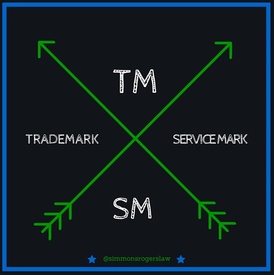 Have you ever seen these symbols and wondered what they are? "TM" and "SM" are usually used with an unregistered trademark or service mark, to inform the public that a term, slogan, logo or other indicator is being claimed as a trademark. "TM" and "SM" are also used when an owner has applied for trademark registration. While the use of the TM or SM symbol is not equal to federal registration. Using your trademark, in commerce, with specific goods and services, establishes legal rights in the mark, known as "common law" rights. You are entitled to these common law rights regardless of whether you use the TM or SM symbols in connection with your mark. However, these common law rights are limited. For example, in some situations, common law trademark rights for unregistered trademarks will only cover a limited geographic area. So what is a trademark? A trademark is a brand name. It is a word, phrase, design, or a combination thereof that identifies and distinguishes the source of goods of one party from those of others. In other words, a trademark lets your consumers know that your goods come only from you and not from anyone else. What is a service mark? A service mark is the same as a trademark, except that it identifies and distinguishes the source of a service rather than a product. When you see the terms "trademark" or "mark" used in reference to intellectual property, you should know that the terms "trademark" and "mark" refer to both trademarks and service marks. For more information on trademarks, check back with the blog for Part 2 of the Intellectual Property: Trademarks and Service Marks post, visit the Trademark section of the United States Patent and Trademark Office or contact your favorite attorney. |
Simmons Rogers, LLCSimmons Rogers, LLC is a full- service civil law firm based in Atlanta, Georgia. We provide legal services as well as mediation and arbitration services, to businesses and individuals throughout the state of Georgia and beyond. Archives
January 2018
Categories
All
This blog is not intended to be a complete explanation of the law. Its purpose is to inform, not to advise on any specific legal problem or legal rights. If you have specific questions regarding any topic in this blog, you are encouraged to consult the Atlanta based law firm of Simmons Rogers, LLC or an attorney licensed in your
state. |

Simmons Rogers, LLC
4045 Orchard Rd SE, Suite 210 Smyrna, Georgia 30080 Phone: 404-445-8146 Fax: 404-445-8226 E-mail: [email protected] |
LEGAL DISCLAIMER
The information on this website is for informational purposes only and is not legal advice. Use of this website does not create an attorney-client relationship between you and Simmons Rogers, LLC. You should not act upon the information within this website without seeking advice from a lawyer licensed in your own state or country. You should not send any confidential information to Simmons Rogers, LLC until and unless a formal lawyer-client relationship has been established in writing. Unless you have received such written confirmation, we will not consider any correspondence you send us as confidential. |
© 2013-2018. All Rights Reserved. Simmons Rogers, LLC
Attorney Advertising. The choice of a lawyer is an important decision and should not be based solely upon advertisements.
Privacy Policy
Attorney Advertising. The choice of a lawyer is an important decision and should not be based solely upon advertisements.
Privacy Policy

 RSS Feed
RSS Feed